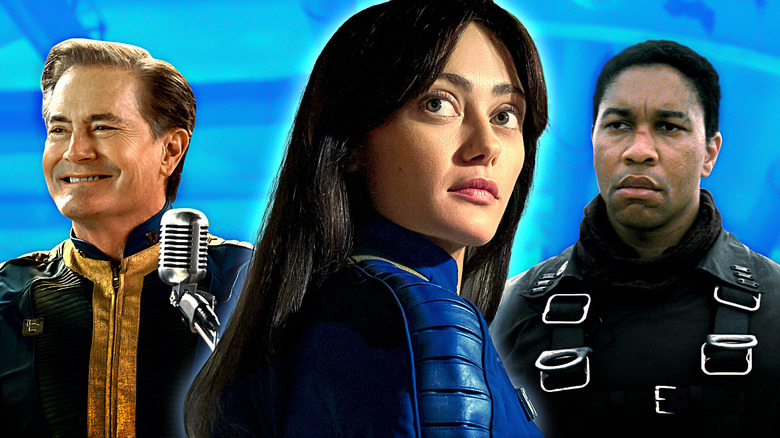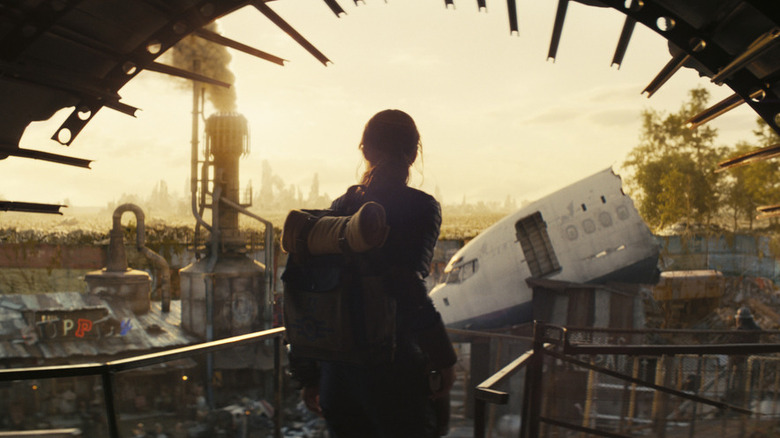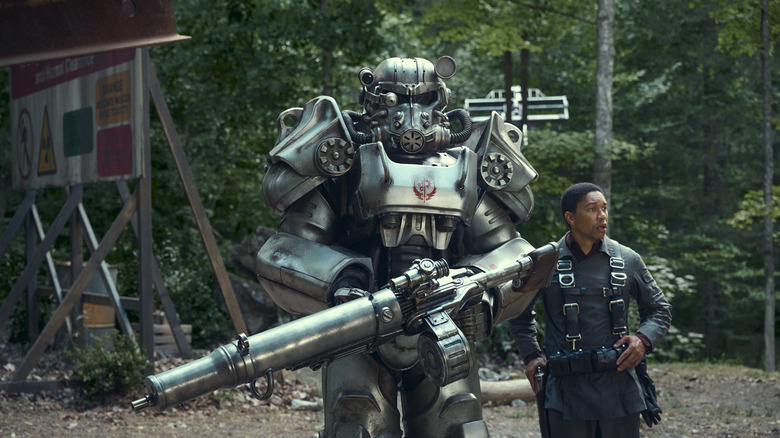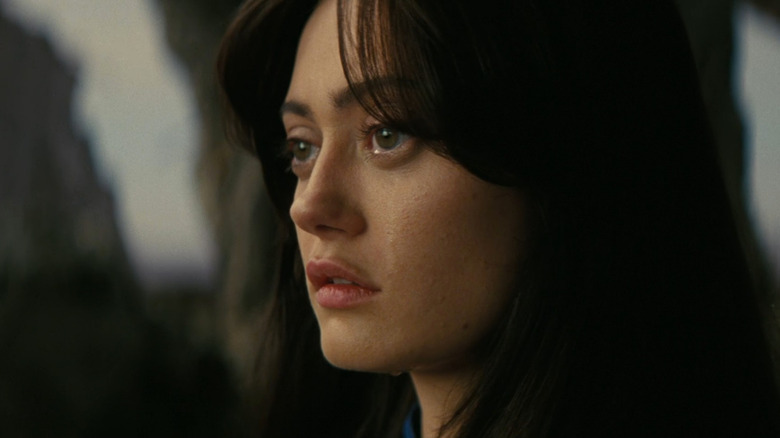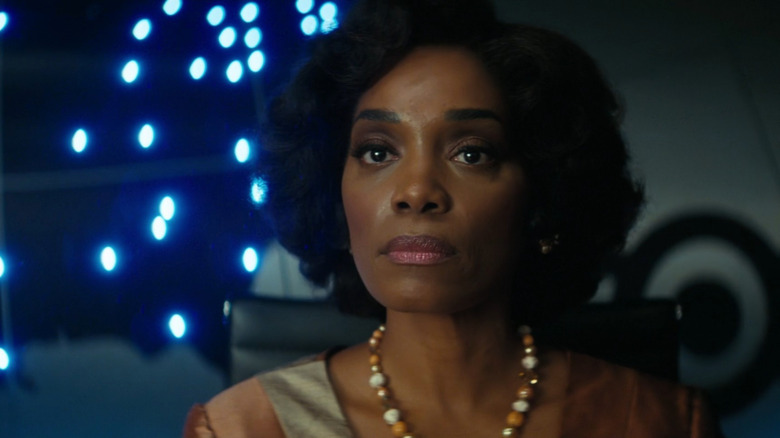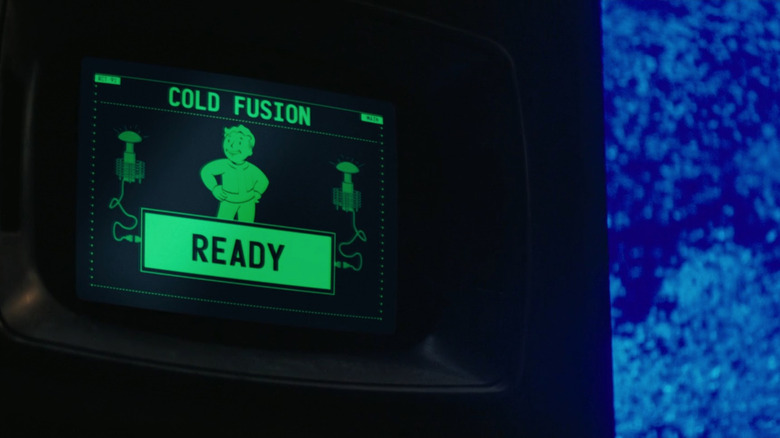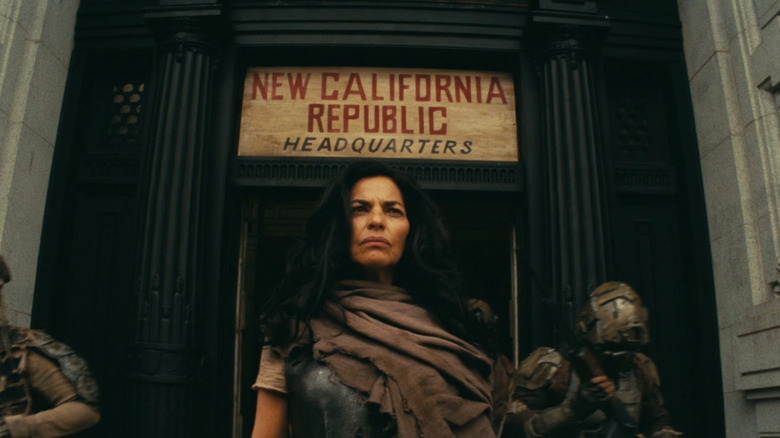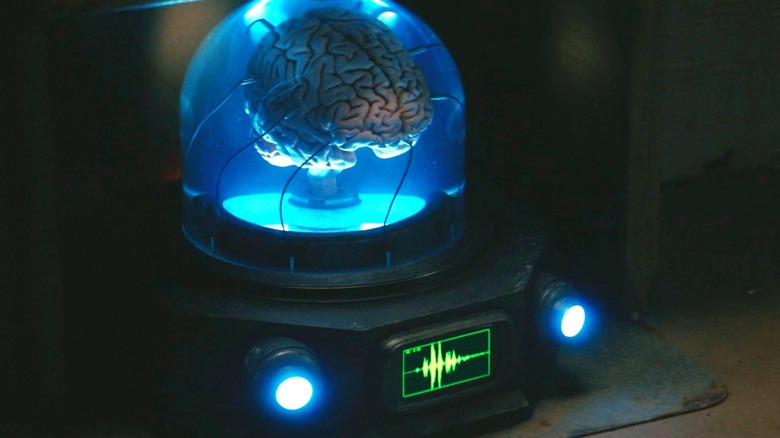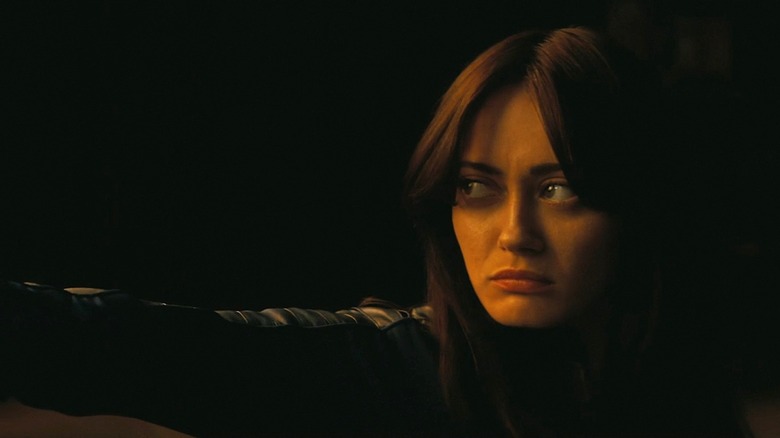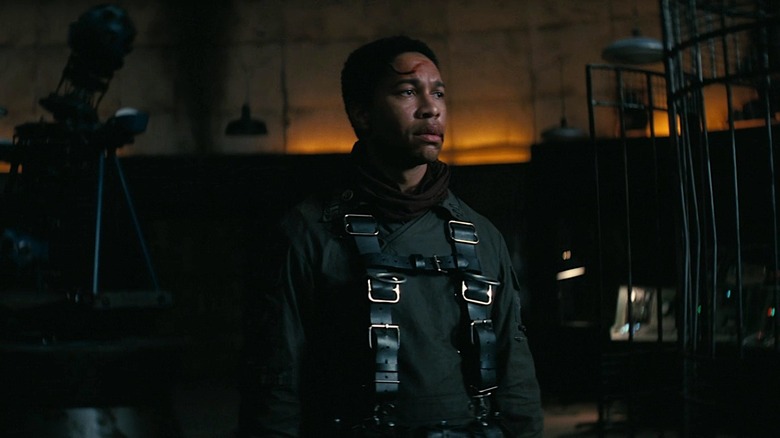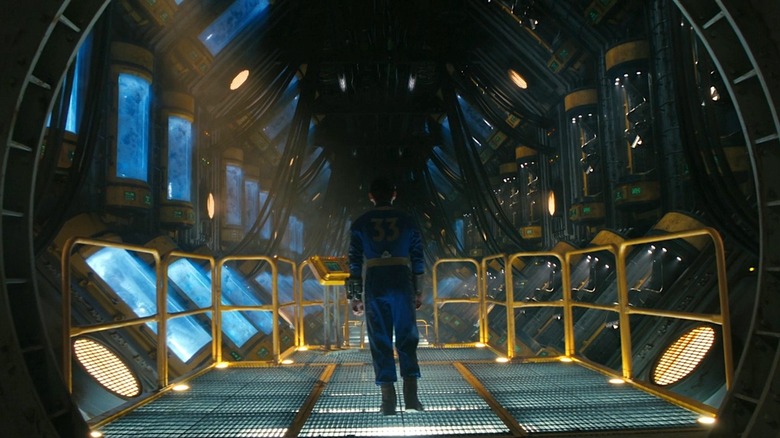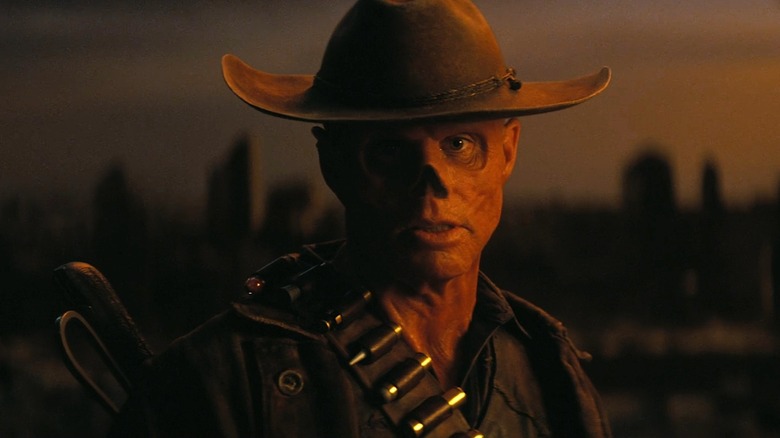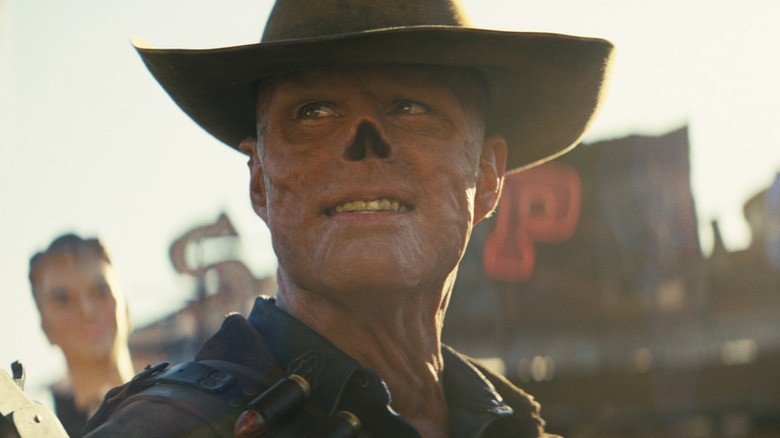Fallout Season 1 Ending Explained: The Power Is On - Now What?
Contains spoilers for "Fallout" Season 1.
"Fallout" fever has swept the nation faster than you can say "bombs away!" And no wonder — this post-apocalyptic pop culture phenomenon is inspired by the wildly popular "Fallout" video game franchise and takes place in a gorgeous and terrifying retro-future that looks like "Mad Men" meets "Mad Max." Plus, that world is populated by a powerhouse cast unafraid to emote or crack jokes like their lives depend on it.
"Fallout" follows a motley crew of characters fighting for survival in a sharply divided world. A world full of radiation, betrayal, bottle caps, and real hope for a better tomorrow. In that world, just over 200 years have passed since nuclear war seemingly wiped out civilization, leaving behind only flesh-eating ghouls, thieving fiends, and mutant creatures on Earth's surface.
Buried below ground, however, are the descendants of those wise (and wealthy) enough to buy a space in Vault-Tec's vaults, where they live a disturbingly 1950s lifestyle while waiting to repopulate the Earth when the surface is ready for peace. Of course, the season ends by blowing up the idea of what peace means when it's decided on by the corporate few. The finale is satisfying, heartbreaking, and also a total cliffhanger. So crack a Nuka Cola, prepare for radioactive levels of SPOILERS, and read on for the ending of "Fallout" Season 1 explained.
What you need to remember about the plot of Fallout
Everyone's searching for something in "Fallout" Season 1. Whether aboveground in the L.A. wasteland or deep beneath it in the vaults, each character spends the season hunting for answers, glory, power, and loved ones. Those on the surface are also after the one item that can seemingly solve their problems: Siggi Wilzig's (Michael Emerson) severed head.
Vaultie Lucy MacLean (Ella Purnell) wants the head to get her dad, Hank (Kyle MacLachlan), back from Moldaver (Sarita Choudhury). Maximus (Aaron Moten) wants it to get knighthood from the punishing Brotherhood of Steel. The Ghoul (an unrecognizable Walton Goggins) follows the bouncing ball — er, head — for reasons we don't fully understand, but they clearly have to do with the flashbacks to his time on Earth before the bombs fell — back when he was a famous cowboy actor doing ads for Vault-Tec and not a real-life gunslinger.
While Lucy struggles to find the head that Wilzig begged her to sever, she also struggles to square life on the surface with what she was taught down below. Meanwhile, her brother, Norm (Moisés Arias), discovers that all isn't okey-dokey in the vaults and that their dad might have something to do with it. The entire season builds to a head — literally — when Lucy finally brings the head to Moldaver and changes the world.
What happened at the end of Fallout?
Maximus reluctantly leads the Brotherhood to the Griffith Observatory. In flashback, the Ghoul, Coop, overhears his wife Barb (Frances Turner) insist Vault-Tec will ensure a return on vault investment by dropping the nuclear bomb themselves. Lucy gives the head to Moldaver at the Observatory, who pulls a vial of cold fusion from it and tells Lucy the truth: Hank destroyed Shady Sands when he discovered Lucy's mother, Rose (Elle Vertes), took the kids to live there.
Heartbroken, Lucy demands Hank give Moldaver the code to activate the cold fusion. He does, but the Brotherhood attacks. Meanwhile, Norm discovers Vault 31 is full of cryogenically frozen Vault-Tec employees. A bloody battle ensues on the surface, ending briefly when Coop shows up to fight the Brotherhood. Hank hurts Maximus and tries to get Lucy to leave with him. She draws on him instead — but isn't able to shoot. Coop, of course, can, and he fires a shot into Hank's shoulder. He recognizes Hank as Barb's young Vault-Tec assistant, Henry — and demands to know where his family is.
Hank flees, using stolen armor to walk to a mysterious city far off in the wasteland. Coop offers Lucy the chance to join him to "meet her makers" and she takes it. Maximus wakes to the power coming back on in the city and Moldaver seemingly challenging him to be a revolutionary like her — even though the Brotherhood knights Maximus after she dies, thinking he is her killer.
What the end of Fallout means
War never changes, but maybe we can — this "Fallout" thesis statement only expands in the final episode. War never changes, but maybe we can — together. While that meaning might seem as hokey as "okey-dokey," the ending of "Fallout" goes hard. It shows how generative true unity can be, how hard it is to create, and also how catastrophically toxic some united fronts can be to the rest of the world. Especially if those fronts hold the world's resources, money, and firepower.
The ending of "Fallout" shows how each faction feels their way of life is the right way. Barb and Vault-Tec want better earnings and a "better" future. The Brotherhood and the Vault Overseers fight for some sort of order in the world, even if creating that order creates bloodshed and instability within their ranks.
It isn't in these massive organizations, "Fallout" seems to say, that we will find anything remotely like a sense of safety or peace. It is instead in the unlikely pairings that happen when we look past the destructive powers dividing us and into our neighbor's eyes — when we see how like us they really are, maybe we can accept them as humans, just like us. Maybe love can bloom, like with Lucy and Maximus. Or maybe an unlikely alliance can form, like with Lucy and Ghoul Coop.
What was Vault-Tec's plan?
Corporate plots to sacrifice the world for money can sneak up on you, so let's explain Vault-Tec's sinister plan, as overheard by an eavesdropping Coop. Barb and Bob (Michael Esper) headed up a meeting of investors getting itchy about peace talks possibly blocking their plans to make big money off fallout shelters during wartime. Barb explained that three interconnected vaults had full resources — aka vaults she wanted her family to reside in during the fallout.
The big secret about the hundred other vaults is that they didn't have enough resources to sustain life but were offered up to investors to experiment on humanity under the guise of developing a better future. Of course, the corporate ideas were deeply gross, and Barb acknowledged that "no one needs to know" what they chose to do. We know from earlier episodes that they do some really wild stuff, like in the original Vault 4 — and between these investors and the radiation, the mutant surface population was born.
Vault-Tec planned to capitalize on wars already brewing after securing investment in their vaults, then drop the bomb themselves to wipe out civilization. While everything icky on the surface petered out, they would wait things out underground, on ice, periodically breeding to slowly take over their brand new world.
What was in the head?
We finally see what was inside the severed head in the ending of "Fallout" — but what does it mean? How did it get there? And why was a code needed for it? The vial contained in Wilzig's head contains the recipe to create cold fusion: a nuclear reaction not yet proven possible in real life, but one that stands to benefit all people in "Fallout." Cold fusion, in the world of "Fallout," powers military armor, weaponry, and even Vault-Tec vaults via handy little canister cores.
Wilzig stole a vial of cold fusion juice and hid it in his own head when Vault-Tec bought out companies that had made significant advancements with the technology — including the one Moldaver and Wilzig worked for. This vial is basically Moldaver's handiwork, but Vault-Tec kept it from her and made it proprietary, meaning only approved Vault-Tec people could access it, via code.
Vault-Tec always took care of its competition by buying it out or burning it to the ground. The cold fusion represents power for all the people of the world, and the ability to have clean water and electricity again. Vault-Tec doesn't want this. Whoever has that power will either be able to change the world — or control it.
Who is Moldaver?
Who is Moldaver? What's the deal with her Griffith Observatory stronghold? Why does the kinda-culty Vault 4 call her "The Flame Mother"? And what is her relationship with Lucy's mother, Rose? Moldaver is a scientist and revolutionary partly responsible for creating cold fusion, back before Vault-Tec dropped the bomb. The Ghoul, Cooper Howard, met her back then, and Moldaver sowed seeds of doubt in him about Barb. Moldaver also somehow survived the hundreds of years of fallout without turning into a ghoul.
While it's unclear how she survived so long, the end of "Fallout" shows that Moldaver is the likely founder of Shady Sands and had some sort of relationship with Rose. Moldaver's "Flame Mother" nickname may come from her ability to create cold flame. When we see Shady Sands in flashback, it is a fully powered oasis, complete with cable cars and lush vegetation.
Moldaver creates another oasis in the Observatory, where she keeps the now-ghoul Rose sustained, possibly due to sentimental reasons. "We did it, Rose," Moldaver says as she lies dying, watching the city light up in front of her. The tenderness with which she takes Rose's hand speaks to a deep intimacy, possibly romantic, or possibly just borne out of being each other's safe haven in a time of chaos.
Who is Management?
In the before times, Bud is a goony executive full of nervous laughter and big ideas. He falls all over himself to befriend Coop, who isn't interested in his training program for junior executives, "Bud's Buds." Bud is high up within Vault-Tec, but he doesn't seem as respected — or composed — as Barb, even though Vault-Tec leans on Bud's Buds to manage the vaults and, by default, the future.
Before-times Bud believes in the power of management, though he ignores nearly all warning signs. There's even a blink-and-miss-it moment during the Vault-Tec meeting where he's visibly uncomfortable with the violent ideas being posed by the corporate leaders for the other vaults. Hundreds of years later, Norm discovers Bud has been literally reduced to Brain on a Roomba status, overseeing a vault full of frozen management professionals.
Bud is miserable now but still can't let of his faith in management. Bud's toxic belief that he and his trainees aren't controlling these people, just using them to make the world better, contextualizes the Management-damning graffiti Norm found in Vault 32 earlier in the season. Bud seems saddened by the bad Management has done, but doubles down on his belief to save face — which has cost him the possibility of having any real buds.
What the end of Fallout means for Lucy
Lucy is one of "Fallout's" baddest asses — and its purest heart. Lucy starts "Fallout" embodying the Golden Rule — do unto others as you would have them do unto you. She believes that vaults are the best place on Earth, that her father is a just man, and that all people are capable of good. But the end of "Fallout" brings out something sharper in Lucy that might make her harder — or more ready to survive the real world while making it a better one.
Lucy starts her journey with Ghoul Coop refusing to be craven and cruel like him, even when he promises that the only thing dividing their behavior is time. Like she says to Moldaver when she returns the head, she was raised better than to stoop to vengeance. But the end of "Fallout" underscores that sometimes, you've gotta be cruel to be kind.
Lucy's big change is shown after she learns about her father's betrayal and he knocks Max out. Instead of killing Coop when he offers her partnership, she shoots her ghoul mother through the head. It's a mercy killing, much like the one she judged Coop for earlier in the season. Lucy trades one father figure for another and stands to learn a lot from Coop — maybe how to embody the more honorable cowboy he used to play in movies, rather than the hard-hearted gunslinger he's become — but only time will tell.
What the end of Fallout means for Maximus
Sometimes it's the worst thing in the world to get what you want, and Maximus gets that to the max at the end of "Fallout" Season 1. Maximus gets knighted only after he realizes he wants to flee the Brotherhood and that most of his life choices have been based on desperation and lies. It's heartbreaking to think the armored knight child Maximus so admired in the aftermath of Shady Sands' destruction was possibly Hank himself.
When Maximus meets Lucy, she sees him for the person he is and not the soldier he forces himself to be. Maximus is young in so many ways and forced to hide his emotions even more rigidly than the Vaulties. Maximus learns he wants a real home shared with someone he cares for, rather than a harsh home full of war. It's a sentiment he shares with Dane (Xelia Mendes-Jones), back in the Brotherhood. The pair forgive each other for their sins and share a real connection. But it becomes clear that neither of them will be allowed to leave the Brotherhood or find anywhere "safe."
The trap Maximus is in — and the fresh loss he finds himself facing — adds to the power of Moldaver's dying words. She seems to challenge Maximus to try and fight the impossible power of the Brotherhood, for the good of the people. Though the odds are stacked against Maximus, a good leader seems on the cusp of being born.
What the end of Fallout means for Norm
Norm MacLean spends all of "Fallout" overcoming his own cowardice to uncover a major conspiracy — and becomes entombed in Vault 31 for his trouble. While Lucy's quest for truth sees her making connections with Maximus, Ghoul Coop, and a variety of people surface-side, Norm's quest for answers leads his only friend, cousin Chet (Dave Register), to abandon him to nefarious forces.
If the finale teaches Lucy that sometimes you can trust the most unlikely allies even when being betrayed by someone you love, the end of "Fallout" teaches Norm that he can trust no one — at least, no one in the Vaults. Even Overseer Betty (Leslie Uggams) gaslights Norm beyond belief and likely won't save him from his Vault 31 trap, lest it ruin all of her plans for Vaults 32 and 33.
While Norm has discovered his bravery by the end of "Fallout" Season 1, he's isolated in more ways than one. And while he now knows Hank is his Popsicle Pops, he doesn't know what Lucy does about their father. If he has no hope of reaching the surface, will he continue to be brave and fight to survive Vault 31 to eventually escape and share the truth with everyone else?
What the end of Fallout means for Coop
The end of "Fallout" is the beginning of Cooper Howard becoming a little more like the good-hearted hero he used to play in the movies and a little less like the murderous lawman he let that movie hero become. Much later, and for hundreds of years, Ghoul Coop is driven by two major forces: survival and family. He's a lone wolf, out hunting for food and his pack — but the end of "Fallout" changes all that.
When Coop finally faces Henry aka Hank again in the Griffith Observatory, he demands to know where his family is. Instead of answering, Hank flies away, ditching his own daughter, because, like her mother before her, she chose to defy him. Instead of also ditching Lucy, Coop invites Lucy to follow her father with him and "meet her makers." He has questions for them and thinks she might, too. When Coop realizes she's mercy-killed her mother the same way he once did a friend, a flicker of pride and sadness flash across his face. Lucy has finally learned a lesson he's taught her — one of kindness, but one he knows has broken her heart.
The fact that the selfish one-man-band Coop offers to bring Lucy with him shows us this ghoul has changed, seemingly for the better. Lucy has lost a father, and Coop has lost a daughter, but they gain an unlikely companion — and teacher — in each other.
What the end of Fallout could mean for the franchise
At the end of Season 1 of "Fallout," Lucy stumbles after Coop through the Hollywood Hills under the Hollywood sign (sponsored by Nuka Cola). Hank approaches a mysterious walled city in the desert. Norm is trapped underground, and Maximus is trapped in the Brotherhood. With so many cliffhangers, there's clearly more story to tell — and audiences are ready to hear it. Also, the state of California granted Amazon a giant tax credit for Season 2, so odds are good that we'll return to the world of "Fallout" soon.
There are stories to resolve, relationships to develop, and side quests to explore — and one brief scene from Barb's big meeting that we hope gets explored in Season 2. When Barb fiddles with her Pitboy in the meeting, she flashes a look up at someone shown only in silhouette on a balcony overlooking the meeting. Only then does she launch into her pitch about the vaults and the bomb. This begs the question, who is that mysterious figure? What does that person have to do with Barb's seeming betrayal of the world — and also, that mysterious city Hank seeks out after the lights come back on? Speaking of those lights, what new factions might form to keep that power safe for the people — or away from them? Here's hoping we don't have to stay in the dark about it for long.
